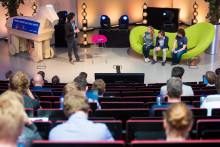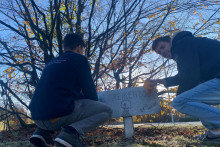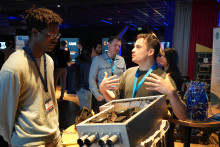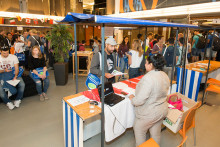An auditorium packed, a lively stage with color lights, and a funny host were part of the setting where the ‘Internet of Things’ was discussed for an entire day. Three experts in the field covered the topic from the technical, commercial and ethical point of view. But some of the most engaging activities were the one-minute-madness challenge and the final debate.
One-minute-madness
For the challenge, 17 PhD candidates who are currently working with CTIT had to summarize their research project in a single minute. Most researchers handled the challenge pretty well, though some of them missed a few seconds to finish their words. After 17 minutes of an overload of information, attendants were invited to read the candidates’ posters in the coffee break area and vote for their favorite contestant using their smartphones.
The big winner was Eyuel Ayele, a researcher born in Ethiopia who is now developing the ‘Internet of Wild Animals’, a system that will help monitor herd’s physiological activity so rangers in wild areas can protect rhinos from poachers. After confessing during the coffee break that he was not expecting to give his one-minute pitch in front of such a big audience, Ayele received his prize. ‘I am happy to contribute to a very serious problem,’ said Ayele, ‘I am rooting for the rhinos’.

Opinions from the younger generation
The closing activity was a debate among three bright students from a secondary school. ‘If we are talking about the latest generation of technology, we should discuss it with the latest generation of humans,’ said the chair of the debate, professor Peter-Paul Verbeek.
Verbeek asked them their thoughts on privacy and trust. ‘You accept so many privacy statements a day,’ said Jan-James Thico, ‘nobody really reads them.’ The students shared some distrust in companies who value profit over protecting privacy. One of them, Adam Mousajeu, proposed the government should be held accountable for protecting people’s data. ‘It’s part of their responsibility to care.’

Verbeek asked the students if they felt a big digital divide between the younger and the older generation. ‘I do think there is an enormous gap,’ quickly answered Thico. He had to clarify to the laughing audience that his father was a smart man but he still had issues with digital devices. ‘A part of me dies every time he googles google.’ Verbeek lastly asked what advice would they give to those who design the technologies younger generations will use in the future. ‘Do things like this,’ answered Annemare Kraak, ‘ask younger generations what they think.’







